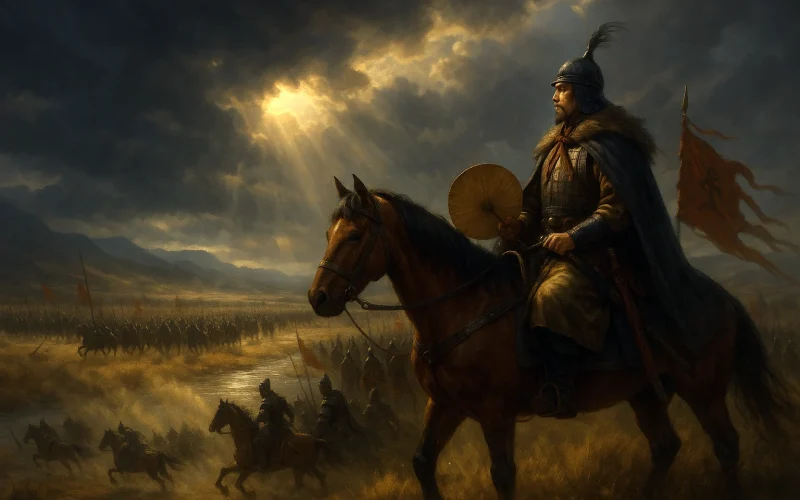Study's toil is like field's toil—
Diligence or sloth, only you know.
But sow abundant seeds of books,
And harvest-time will surely show.
Original Poem
「游郭希吕石洞二十咏 · 书院」
刘过
力学如力耕,勤惰尔自知。
但使书种多,会有岁稔时。
Interpretation
This poem from Liu Guo's Twenty Odes to Guo Xilü's Stone Cave celebrates the scholarly sanctuary built by Guo Xili in Shangrao, Jiangxi. Amidst the Southern Song's precarious stability and the rise of Neo-Confucianism, Liu—despite career setbacks—fuses personal aspiration, intellectual cultivation, and national destiny in these verses. Composed within Guo's mountain academy, the work champions diligent study as cultural inheritance and moral resistance, embodying the era's ethos of self-cultivation amid political uncertainty.
First Couplet: "力学如力耕,勤惰尔自知。"
Lì xué rú lì gēng, qín duò ěr zì zhī.
To strive in learning
is to strive in farming—
diligence or sloth,
only you truly know.
Liu's agricultural analogy roots scholarship in bodily labor. "Strive in farming" (力耕) elevates study to existential necessity, while "only you know" (尔自知) invokes Confucian self-examination—a private reckoning with one's intellectual integrity.
Second Couplet: "但使书种多,会有岁稔时。"
Dàn shǐ shū zhǒng duō, huì yǒu suì rěn shí.
Sow abundant seeds
of knowledge—
a harvest time
will surely come.
The metaphor evolves: "seeds of knowledge" (书种) transforms reading into generative act, while "harvest time" (岁稔时) promises epistemic fruition. This couplet bridges agricultural patience and scholarly hope—an antidote to intellectual instant gratification.
Holistic Appreciation
In twenty characters, Liu constructs an agrarian epistemology. The first couplet's emphasis on self-aware exertion ("diligence or sloth, only you know") mirrors Neo-Confucian vigilance against moral laxity. The second couplet's "seeds of knowledge" extends Zhu Xi's "investigating things" (格物), framing study as cyclical cultivation where effort guarantees yield.
The poem's genius lies in its spatial compression: the academy becomes a symbolic field, books turn to seeds, and the scholar's desk merges with the farmer's plot. Liu's closing "harvest time" transcends agricultural metaphor—it envisions cultural renaissance in a fractured nation.
Artistic Merits
- Agrarian Allegory
"Strive in farming" (力耕) and "seeds of knowledge" (书种) create a sustained metaphor linking soil and soul. - Introspective Imperative
"Only you know" (尔自知) internalizes accountability, rejecting performative scholarship. - Temporal Architecture
The progression from sowing ("sow seeds") to reaping ("harvest time") maps intellectual growth onto seasonal cycles. - Concise Didacticism
Twenty characters distill educational philosophy into memorizable wisdom.
Insights
Liu's poem reframes learning as ethical agriculture: just as farmers steward land, scholars must tend minds. Its "seeds of knowledge" metaphor remains startlingly relevant—in an age of information overload, true wisdom still requires patient cultivation, not mere data consumption.
The couplet "diligence or sloth, only you know" speaks to modern self-deception: when algorithms curate knowledge, we risk mistaking scrolling for study. Liu reminds us that intellectual harvest demands active sowing—annotating texts, debating ideas, wrestling with complexity.
Ultimately, the poem posits education as counter-culture: against political turbulence ("precarious Song"), it offers the "harvest time" of accumulated wisdom—a quiet revolution where books become seeds of national renewal.
About the Poet

Liu Guo (刘过 1154 - 1206), a native of Taihe in Jiangxi, was a ci poet of the Bold and Unconstrained School (haofang pai) during the Southern Song Dynasty. Though he remained a commoner all his life, wandering the rivers and lakes, he associated with literary giants like Lu You and Xin Qiji. His ci poetry is impassioned and heroic, and his verse is vigorous and forceful. Stylistically close to Xin Qiji but even more unrestrained, Liu Guo became a central figure among Xin’s poetic followers.












